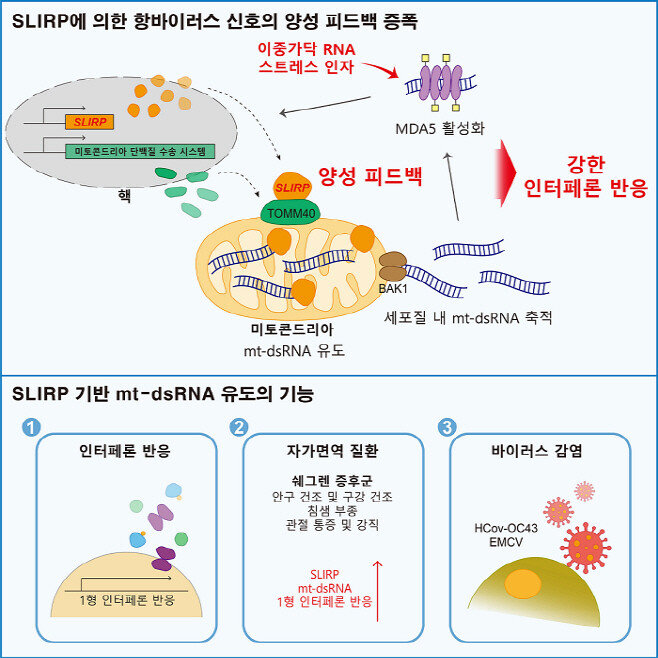
A joint research team led by Professor Kim You-sik of the Department of Chemical and Biomolecular Engineering at KAIST and Professor Seung-hee Cha of Florida State University in the United States has garnered academic attention for elucidating the mechanism of action of 'SLIRP (Steroid receptor RNA activator interacting protein),' a key protein that precisely regulates the immune response within the human body. This research has revealed that the SLIRP protein plays a crucial 'switch' role in the process by which mitochondrial double-stranded RNA (mt-dsRNA), originating from mitochondria – the cell's powerhouses – amplifies the immune response. This finding is expected to open new avenues for strategies to combat infectious diseases as well as for the treatment of intractable autoimmune disorders.
Autoimmune diseases refer to pathological conditions in which the body's immune system attacks its own normal cells and tissues instead of external invaders like pathogens. They manifest in various forms, including rheumatoid arthritis, lupus, and Sjogren's syndrome, and the lack of a clear understanding of their exact causes has hindered the development of effective treatments. Since these diseases are primarily characterized by an overactivated immune response, the research team focused on understanding the fundamental molecular mechanisms that induce immune hyperactivation and identifying key factors that can control it.
The research team paid close attention to mt-dsRNA, genetic material produced in mitochondria, cellular organelles. They hypothesized that mt-dsRNA, structurally similar to viral RNA, could be recognized by the human immune system as an external invasion even in the absence of external viral infection, potentially triggering an excessive immune response.
Through experiments, the team discovered that the SLIRP protein binds to this mt-dsRNA and plays a central role in amplifying the immune response. They observed a significant increase in the expression levels of the SLIRP protein in tissue samples from various autoimmune disease patients and in experimental models mimicking viral infection environments. Conversely, when the function of the SLIRP protein was inhibited, abnormal immune responses markedly decreased. These results strongly suggest that the SLIRP protein acts as a central axis in the immune amplification process.
Through more in-depth analysis, the research team elucidated the specific mechanism by which the SLIRP protein amplifies the immune response: by increasing the stability of mt-dsRNA and promoting its accumulation within cells. The SLIRP protein acts like an 'adhesive' that prevents the degradation of mt-dsRNA, consequently leading to the continuous activation of the immune system.
A significant achievement of this research is the consistent function of the SLIRP protein observed in both viral infection and autoimmune disease environments, which are seemingly opposing disease conditions. In cell models infected with human betacoronavirus OC43 and encephalomyocarditis virus EMCV, inhibiting the expression of the SLIRP protein weakened the antiviral immune response and, paradoxically, increased the viral replication rate. This suggests that the SLIRP protein may also play a role in normal viral defense mechanisms.
On the other hand, analysis of blood and salivary gland cells from patients with Sjogren's syndrome, a representative autoimmune disease, showed significantly high expression levels of both the SLIRP protein and mt-dsRNA. Interestingly, when the function of the SLIRP protein was inhibited in these patient cells, the abnormally activated immune response tended to subside significantly. This result strongly supports the notion that the SLIRP protein acts as a key 'molecular switch' that regulates immune responses under different pathological conditions, namely infectious diseases and autoimmune disorders.
Professor Kim You-sik emphasized, "Through this research, we have clearly identified the SLIRP protein as a key factor that induces the amplification of the immune response based on mt-dsRNA. The fact that SLIRP acts as a common immune modulator in opposing situations – autoimmune diseases and viral infections – is particularly important. We anticipate that future strategies for regulating immune balance by specifically targeting the SLIRP protein can offer new possibilities for treating various infectious diseases as well as intractable autoimmune disorders."
This groundbreaking research was published online on April 19th in the prestigious international journal 'Cell Reports,' recognizing its scientific value. This discovery offers hope for the development of new treatment strategies for patients suffering from infectious diseases and autoimmune disorders and is expected to invigorate related research fields in the future.
[Copyright (c) Global Economic Times. All Rights Reserved.]






























